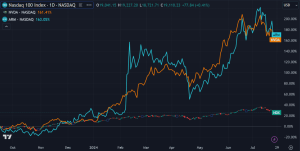Share this page:
It’s been a fairly surprising start to the year for investors with plenty of big-name investment trusts posting some huge losses. As a result of wider economic issues, you might be considering whether to stick or twist with your current strategy.
So, to help you in your research, I’m going to reveal some of the most popular trusts right now. I’ll also cover how you can buy shares in these investments and tips on using them to your advantage.
What were the 10 most popular investment trusts in January?
According to data from the Interactive Investor platform, these were the most-bought investment trusts last month, along with their yearly return to date:
| Rank | Investment trust | Sector | 1-year performance to 1 February 2022 |
| 1 | Scottish Mortgage (SMT) | Global | -15.5% |
| 2 | Smithson Investment Trust (SSON) | Global smaller companies | 1.3% |
| 3 | Edinburgh Worldwide (EWI) | Global smaller companies | 40.6% |
| 4 | Allianz Technology (ATT) | Technology and media | -4.4% |
| 5 | City of London (CTY) | UK equity income | 20.5% |
| 6 | HarbourVest Global Private Equity (HVPE) | Private equity | 47% |
| 7 | Baillie Gifford US Growth (USA) | North America | -33.1% |
| 8 | BlackRock World Mining (BRWM) | Commodities and natural resources | 21.7% |
| 9 | Capital Gearing (CGT) | Flexible investment | 8.6% |
| 10 | Polar Capital Technology (PCT) | Technology and media | 0.6% |
Should you pick investment trusts with the biggest returns?
Just because a fund has had great returns doesn’t guarantee it will continue to do so. What’s often the case is that when an investment trust posts great return numbers, its explosion has already happened and things might look somewhat muted for a while.
This has been the case with Scottish Mortgage (SMT). The trust has had some pretty outstanding returns over the last few years, and plenty of investors hopped on thinking the climb would never stop. The yearly return so far doesn’t look great, but it needs to be taken into context of the trust’s strong performance over the last 10 to 15 years.
Some of the returns shown can also look skewed due to the weird events of the last few years. Until recently, it’s been an unusually good time for tech and generally quite bad for income and dividends.
But now the situation has flipped. So, tech-related investments look much worse compared to previous results. And income trusts look much better. This is all because the coronavirus pandemic threw up some really unexpected circumstances, such as the banning of dividends from UK banks!
As you can see, some investment trusts following the same sectors can have wildly different returns. So, before you consider buying shares, it’s important to research and compare each option thoroughly.
How should investors use investment trusts?
The best time to invest in these funds is usually when the prices are depleted rather than when they’re riding high.
Because there are such a variety of investment trusts that all focus on different areas, the most useful path is to create some diversification using various trusts.
That way, each one should perform well under changing circumstances. This should increase your chances of more consistent gains and help to limit your losses when some underperform. For example, you could split your investment across trusts that focus on:
- Technology and growth
- Energy, commodities and mining
- Income
- Private equity
The other important thing is to keep a long-term mindset. Plenty of investment trusts will perform well and plenty will perform poorly over the time frame of a year or less.
As part of your research, it’s wise to get out your investing microscope to study the funds and see how they’ve fared over longer periods, not just the last year.
How can you invest in investment trusts?
You can buy shares in the same way you would with any other investment. The benefit is that investment trusts provide a solid way of getting experts to manage your investments at a reasonable cost.
There’s also such a diversity of choices that there should be a trust out there that could play a part in most strategies.
But, in order to get full access to the range of options available, it’s important to use a platform like Interactive Investor that gives you a wide range to choose from.
And if you really want to boost your return prospects, consider using the Interactive Investor Stocks and Shares ISA, which will help protect your returns from tax.
All investing carries risk, and amongst the hundreds of funds out there, some are better managed than others. So make sure you do plenty of research and always remember you may get out less than you put into your investments.
Was this article helpful?
YesNo
About the author
George is a freelance writer focused on educating others in personal finance, tax, and investing. He’s a qualified Financial Adviser and previously worked within property and insurance in a number of different countries…. Read More
Share this page:
Some offers on The Motley Fool UK site are from our partners — it’s how we make money and keep this site going. But does that impact our ratings? Nope. Our commitment is to you. If a product isn’t any good, our rating will reflect that, or we won’t list it at all. Also, while we aim to feature the best products available, we do not review every product on the market. Learn more here. The statements above are The Motley Fool’s alone and have not been provided or endorsed by bank advertisers. John Mackey, CEO of Whole Foods Market, an Amazon subsidiary, is a member of The Motley Fool’s board of directors. The Motley Fool UK has recommended Barclays, Hargreaves Lansdown, HSBC Holdings, Lloyds Banking Group, Mastercard, and Tesco.
This post was originally published on Motley Fool







